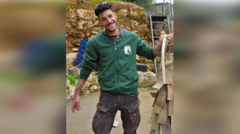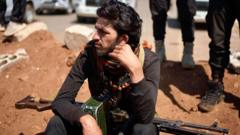The tragic suicide bombing during a Mass in Damascus, attributed to Islamic State, underscores the persistent threat of terrorism in the region as the country grapples with ongoing sectarian violence and calls for enhanced security measures.
Deadly Suicide Bombing at Damascus Church Claims Lives, Highlights Ongoing Terror Threat

Deadly Suicide Bombing at Damascus Church Claims Lives, Highlights Ongoing Terror Threat
A suicide attack at the Greek Orthodox Church in Damascus results in 22 fatalities, raising concerns about security in Syria.
At least 22 individuals were killed and 63 more were injured in a suicide bombing at the Greek Orthodox Church of the Prophet Elias in the Dweila neighborhood of Damascus, Syria, according to the health ministry. The incident, which took place on a Sunday evening, began as the attacker opened fire inside the church before detonating an explosive vest. The interior ministry has claimed the assailant was linked to the jihadist group Islamic State (IS), although the group has not immediately claimed responsibility for the attack.
Images from within the church depict chaotic scenes: a damaged altar, shattered pews, and blood-soaked floors. Witnesses recounted horrific moments, describing the armed intruder entering the church, followed by gunfire and a devastating explosion. One local, Lawrence Maamari, reported that congregants attempted to subdue the attacker before the bomb detonated. Another eyewitness, Ziad, detailed the aftermath, with wooden benches scattered and flames visible from outside.
This incident marks the first such attack in Damascus since Islamist-led rebel forces overthrew President Bashar al-Assad in December, concluding a lengthy civil conflict. The Greek Orthodox Patriarchate of Antioch condemned the attack, stating, "The treacherous hand of evil struck this evening, claiming our lives, along with the lives of our loved ones." They urged Syria's provisional authorities to take responsibility for ongoing assaults on places of worship and to safeguard all citizens.
Interior Minister Anas Khattab initiated an investigation into what he described as a "reprehensible crime." He asserted that such acts would not deter the Syrian state from its quest for civil peace. The United Nations Special Envoy for Syria, Geir Pedersen, condemned the bombing and called for unity against terrorism. The U.S. Special Envoy, Tom Barrack, echoed these sentiments, labeling the attacks cowardly and emphasizing the need for a shared commitment to tolerance and inclusion.
Interim President Ahmed al-Sharaa’s administration, while pledging to protect minorities, faces scrutiny due to Syria's history of sectarian violence. In recent months, threats to Christians and other minorities have escalated, with IS targeting these communities in past attacks. Despite military defeats, IS's influence persists, posing a significant danger as they may exploit Syria's unstable transition for recruitment and renewed operations.
A February UN report indicated that IS retains an estimated 1,500 to 3,000 fighters in Syria and Iraq, many based within Syrian territory. While thousands of IS affiliates are imprisoned, the threat of resurgence remains a stark reality for the nation’s security landscape.






















